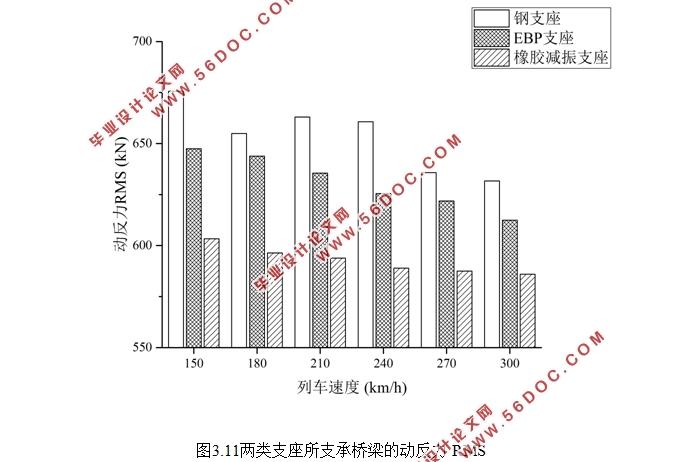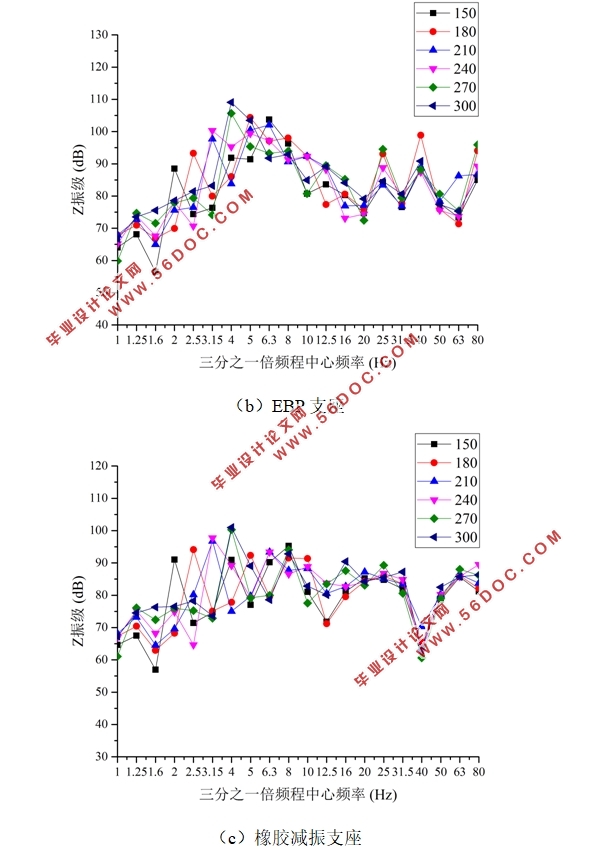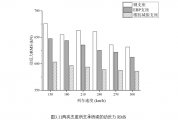橡胶支座对高架桥竖向车致振动的减振效果研究
来源:56doc.com 资料编号:5D22944 资料等级:★★★★★ %E8%B5%84%E6%96%99%E7%BC%96%E5%8F%B7%EF%BC%9A5D22944
资料以网页介绍的为准,下载后不会有水印.资料仅供学习参考之用. 密 保 惠 帮助
资料介绍
橡胶支座对高架桥竖向车致振动的减振效果研究(任务书,开题报告,论文24000字)
摘要
随着城市内、城际间的高架桥兴建,环境振动问题愈加明显,新型减振措施亟待开发。钢支座的摒弃和各类橡胶支座的广泛应用使车桥耦合相关的研究者们注意到了桥梁支座不再是刚性支承。本文基于前人的研究成果,针对高速列车通过柔性支承桥梁时引发的振动与橡胶支座的减振效果进行了以下研究:建立柔性支承桥梁与列车数学模型,推导了车-桥系统耦合振动方程;分析了柔性支承与列车减振装置对桥梁振动的影响;分析了橡胶支座(柔性支承)的刚度、阻尼参数和列车速度对支座减振效果的影响,给出了合理的减振支座参数取值建议。
研究结果表明:柔性支承与列车减振装置的存在对桥梁振动响应具有明显影响;一定的支座阻尼下,支座竖向刚度减小会加剧桥梁上部结构振动响应而减弱下部结构振动;一定的支座阻尼会同时减小上、下部结构振动响应;为达到最佳的减振效果,应在确保桥梁结构安全的前提下,尽可能地减小支座竖向刚度而使支座阻尼系数接近或等于临界值;与钢支座及EBP支座相比,橡胶减振支座在车致环境振动上具有更好的减振性能。
本文的特色为,从桥梁动力微分方程入手分析车致振动,同时考虑支座的竖向刚度与阻尼系数来建立粘弹性支座模型,在此基础上推导了车-桥系统耦合振动方程。
关键词:橡胶支座;阻尼系数;车桥耦合振动;减振分析
Abstract
Environmental vibration issues become increasingly outstanding and new vibration reduction methods are developed in a hurry as more viaducts in and between cities are built. Nevertheless abandoning steel bearing and widely applying various rubber bearings make researchers notice that bridge supporters are not rigid anymore. Based on previous research results and aiming at the vibration caused by high-speed trains running through bridge seated on elastomeric bearings and the reduction vibration effects of rubber bearing, the followings were studied in this thesis:the mathematicalmodels of bridge seated on elastomeric bearings and train were built and the coupled vibration equations of train-bridge system were derived; the influences of existence of elastomeric bearing and vibration reducing device in trains on bridge vibration were analyzed; influences of the stiffness and damping coefficients of rubber bearing (elastomeric bearing) and train speed on vibration reducing effect of bearing were studied and provide reasonable advice for parameter values of vibration-reducing bearings.
The results indicate: the existences of elastomeric bearing and vibration reducing device of trains have obvious influences on vibration response of bridge; vibration response of superstructure intensifies and yet that of substructure weakensas vertical stiffness of bearing decreases when bearings are provided with a certain damping;the existence of damping of bearing remarkably weakens vibration response of both superstructure and substructure; for the best reducing effect, stiffness of bearings should be as small as possible and make damping close or equal to critical value after ensuring the safety of structure; compared with steel bearing and EBP, rubber bearingspossess better performance of reducing traffic-induced environmental vibration.
This paper is outstanding at studying vehicle-induced vibration from the angle of dynamical differential equation of bridge. Both stiffness and damping coefficients of bearing are consideredto build mathematical model of viscoelastic bearing, on whose basiscoupled vibration equations of train-bridge system were actively derived.
Key Words:rubber bearing;damping coefficient;vehicle-bridge coupled vibration;vibration reducing effect analysis


目录
第1章 绪论 1
1.1 研究的背景和意义 1
1.2 国内外研究现状 2
1.2.1 桥梁支座发展现状 2
1.2.2 减振措施研发现状 5
1.2.3 减振支座研究现状 6
1.3 本文研究工作的主要内容 7
第2章 柔性支承下车-桥系统计算模型与运动方程 9
2.1 车-桥系统计算模型 9
2.1.1 柔性支承桥梁模型 9
2.1.2 列车模型 10
2.2 车-桥系统运动方程 11
2.2.1 移动集中力 11
2.2.2 移动车轮加簧上质量 17
2.3 计算模型对比分析 24
2.4 本章小结 28
第3章 橡胶支座竖向减振效果的影响分析 30
3.1 振动响应的评价方法 30
3.1.1 上部结构 30
3.1.2 下部结构 30
3.2 桥梁支座参数的影响 31
3.2.1 支座刚度的影响 31
3.2.2 支座阻尼的影响 36
3.2.3 支座刚度与阻尼的共同影响 40
3.3 列车速度的影响 43
3.4 本章小结 48
第4章 结论与展望 50
4.1 结论 50
4.2 展望 51
参考文献 52
致谢 54
|





